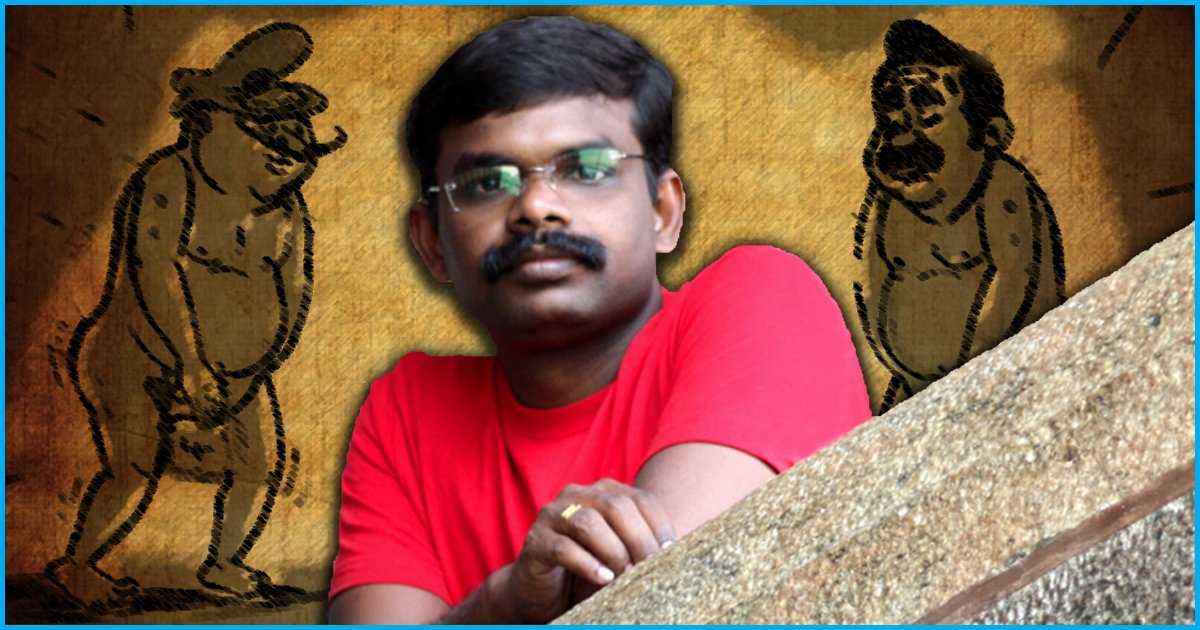
Cartoonist In Tamil Nadu Arrested For Exercising Free Speech On Social Media
6 Nov 2017 8:22 AM GMT
Editor : Pooja Chaudhuri
The only fiction I enjoy is in books and movies.
G Bala, a freelance cartoonist from Tirunelveli, Tamil Nadu, was arrested on Sunday, November 5 by the crime branch wing for posting a caricature on social media criticising Chief Minister Edappadi K Palaniswami and the district administration.
The cartoon
The post that led to his arrest was a cartoon of Tirunelveli police commissioner, district collector, and the Chief Minister gathered around a burning child, with their eyes downcast. The authorities are shown nude in the caricature, covering themselves with cash bundles.

Bala held them responsible for the death of the family that immolated themselves before the Tirunelveli collector two weeks ago.
Isakkimuthu, a labourer, set himself, his wife and two children on fire by dousing kerosene after his submission of repeated pleas regarding relief from harassment by moneylenders over unpaid debts fell onto deaf ears.
He had borrowed Rs 1.45 Lakh from their neighbourhood moneylenders Muthulakshmi and Ganapathiraj. The interest rate was fixed at 10% of the entire amount, till the time the whole principal is not paid off.
They had already paid Rs 2.34 lakh, yet they were being subjected to constant harassment. The moneylenders would harass them in front of their children. Unable to tolerate the bullying by moneylenders, the collectorate office and the police, Isakkimuthu set himself and his entire family ablaze.
Bala’s cartoon attracted more than 38,000 shares on social media. “Aama… intha cartoon aathirathin uchathil thaan varanthien” (Yes… I drew this cartoon at the height of my anger), he said, as reported by The Times of India.
Arrest
An FIR was filed against Bala under Sections 501 (printing or engraving matter known to be defamatory) of the Indian Penal Code and Section 67 (punishment for publishing or transmitting obscene material in electronic form) of the Information Technology Act.
Tirunelveli superintendent of police P Ve Arunsakthikumar said, “I am not against criticism. But the cartoonist has got the facts wrong. He has depicted the honourable chief minister and two government officials in an obscene manner. The cartoon will make people assume that we are staying silent over the issue after accepting a bribe.”
Many have condemned the arrest. People’s Union for Civil Liberties (PUCL) national council member M Balamurugan termed the arrest “undemocratic”. “Are we in a state ruled by democracy or by the police,” he asked. Its state secretary R Murali said, “This is a violation of the cartoonist’s fundamental right of free speech and expression.”
“It is a fascist act against freedom of expression,” said Naam Tamizhar Katchi leader Seeman.
“Arrest of the cartoonist is muzzling freedom of speech and expression. I have it as my Facebook profile picture,” said S P Udayakumar, anti-nuclear and human rights activist.
The Logical Indian take
Too many cases have come to light where our representatives have shown no capacity for tolerating criticism, even in the form of humour.
In the last 10 days, at least five citizens have been arrested across India for expressing contradictory views on social media.
A 19-year-old man was arrested in Tamil Nadu for posting “derogatory” remarks about PM Modi on a Facebook personal chat. Another 32-year-old was arrested in the state for criticizing State Fisheries Minister Jayakumar on social media.
A 2016 report by Hindustan Times showed that the Tamil Nadu government kept busy by filing 213 defamation cases in the last five years for “derogatory statements” against former CM J Jayalalithaa, and this included cases only against political opponents and media houses.
To keep critics at bay, authorities have used defamation as the easiest way of rebutting censure, coming second only to Section 67 of the IT Act.
Section 67 gives immense power to the government or anyone in a position of influence to curb criticism. It is against the common man’s interests. Its usage of terms “obscene”, “lascivious”, “prurient”, “with an intent to cause harm” is vague. It gives the government complete impunity to disregard what it constitutes a threat to its rule. Time and again, the Section has been used by political leaders to curb free speech on the Internet. It needs to have the same fate as Section 66A of the IT Act – deemed unconstitutional by the Supreme Court in 2015.
Our freedom of expression comes with the license to offend. This is the sole way a democracy can function – when all opinions, even if distasteful for some, are given a platform to be expressed. There will always be an urge to shut out opinions that are against those in power, for them to stay in power.
Any law is meant to safeguard citizens and the country, not the government. It is when we understand this, the debate on free speech will be in our favour.
Also read:
 All section
All section













